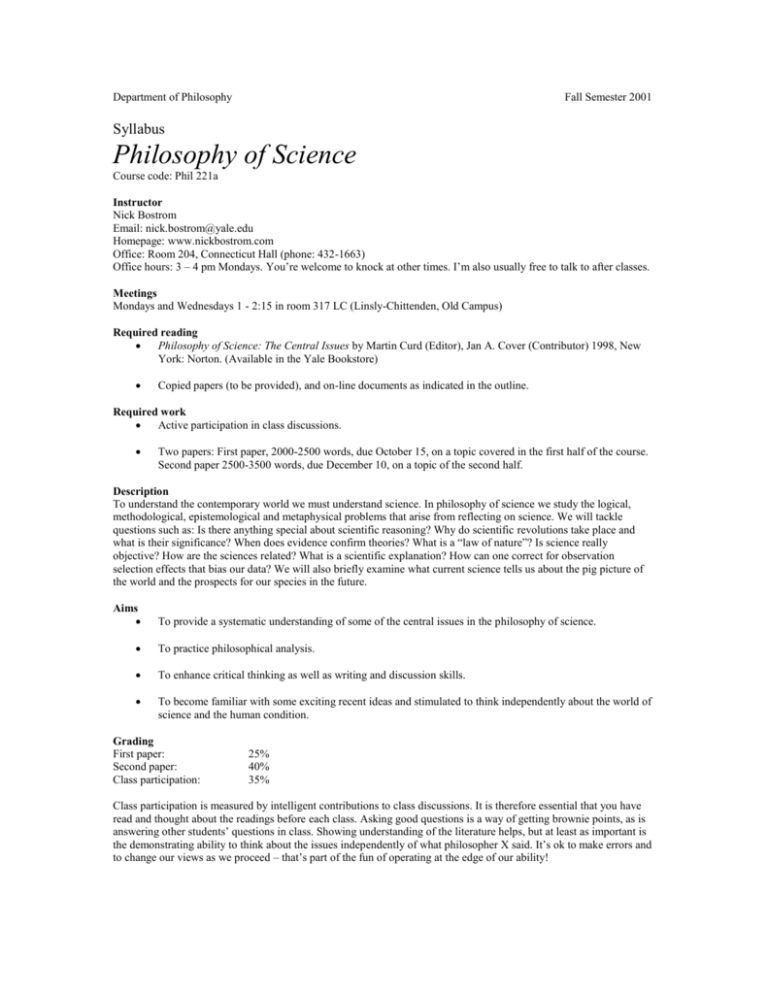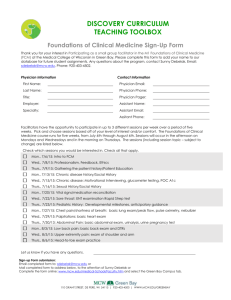Department of Philosophy - Nick Bostrom`s Home Page
advertisement

Department of Philosophy Fall Semester 2001 Syllabus Philosophy of Science Course code: Phil 221a Instructor Nick Bostrom Email: nick.bostrom@yale.edu Homepage: www.nickbostrom.com Office: Room 204, Connecticut Hall (phone: 432-1663) Office hours: 3 – 4 pm Mondays. You’re welcome to knock at other times. I’m also usually free to talk to after classes. Meetings Mondays and Wednesdays 1 - 2:15 in room 317 LC (Linsly-Chittenden, Old Campus) Required reading Philosophy of Science: The Central Issues by Martin Curd (Editor), Jan A. Cover (Contributor) 1998, New York: Norton. (Available in the Yale Bookstore) Copied papers (to be provided), and on-line documents as indicated in the outline. Required work Active participation in class discussions. Two papers: First paper, 2000-2500 words, due October 15, on a topic covered in the first half of the course. Second paper 2500-3500 words, due December 10, on a topic of the second half. Description To understand the contemporary world we must understand science. In philosophy of science we study the logical, methodological, epistemological and metaphysical problems that arise from reflecting on science. We will tackle questions such as: Is there anything special about scientific reasoning? Why do scientific revolutions take place and what is their significance? When does evidence confirm theories? What is a “law of nature”? Is science really objective? How are the sciences related? What is a scientific explanation? How can one correct for observation selection effects that bias our data? We will also briefly examine what current science tells us about the pig picture of the world and the prospects for our species in the future. Aims To provide a systematic understanding of some of the central issues in the philosophy of science. To practice philosophical analysis. To enhance critical thinking as well as writing and discussion skills. To become familiar with some exciting recent ideas and stimulated to think independently about the world of science and the human condition. Grading First paper: Second paper: Class participation: 25% 40% 35% Class participation is measured by intelligent contributions to class discussions. It is therefore essential that you have read and thought about the readings before each class. Asking good questions is a way of getting brownie points, as is answering other students’ questions in class. Showing understanding of the literature helps, but at least as important is the demonstrating ability to think about the issues independently of what philosopher X said. It’s ok to make errors and to change our views as we proceed – that’s part of the fun of operating at the edge of our ability! Course outline Class # Date Sept: 1 Wed 5 Topic Reading * Introduction. The Demarcation problem I: What is science? The Demarcation problem II: The “creation-science” controversy Robin Hanson, “Are Beliefs Like Clothes?” [handout] 2 Mon 10 3 Wed 12 Rationality, Objectivity, and Values in Science I 4 Mon 17 5 Wed 19 6 Mon 24 7 Wed 26 Rationality, Objectivity, and Values in Science II Rationality, Objectivity, and Values in Science III The Quine-Duhem Thesis and Underdetermination I The Quine-Duhem Thesis and Underdetermination II 8 Oct: Mon 1 9 Wed 3 10 Mon 8 11 Wed 10 12 Mon 15 13 Wed 17 14 Mon 22 15 Wed 24 16 Mon 29 Empiricism vs. Scientific Realism I Empiricism vs. Scientific Realism II Models of Explanation I 17 Wed 31 Models of Explanation II 18 19 Nov: Mon 5 Wed 7 Laws of Nature I Laws of Nature II 20 Mon 12 21 Wed 14 Induction, Prediction, and Evidence I Induction, Prediction, and Evidence II Induction, Prediction, and Evidence III Confirmation and Relevance: The Bayesian Approach I Confirmation and Relevance: The Bayesian Approach II First paper due Improving Science: A Proposal Observation Selection Effects I: “Theories of Everything” and fine-tuning arguments Observation Selection Effects II: Evolutionary biology – How Michael Ruse, “Creation Science is not Science” Larry Laudan, “Science at the Bar -- Causes for Concern”. Ruse’s “Response to the Commentary” Visit Creation Science Home page: http://emporium.turnpike.net/C/cs/ Thomas S. Kuhn, “The Nature and Necessity of Scientific Revolutions” Thomas S. Kuhn, “Objectivity, Value Judgment and Theory Choice” Vernan McMullin, "Objectivity, Value Judgment, and Theory Choice" Helen E. Longino, “Values and Objectivity” W. V. Quine, “Two Dogmas of Empiricism” Larry Laudan, “Demystifying Underdetermination” Karl Popper, “The Problem of Induction” Wesley C. Salmon, “Rational Prediction” Carl Hempel, “Criteria of Confirmation and Acceptability” Laura Snyder, “Is Evidence Historical?” Peter Achinstein, “Explanation v. Prediction: Which Carries More Weight?” Wesley C. Salmon, “Rationality and Objectivity in Science…” Clark Glymour, “Why I am not a Bayesian” Robin Hanson, “Could Gambling Save Science?” Available at http://hanson.gmu.edu/gamble.html Grover Maxwell, “The Ontological Status of Theoretical Entities” Bas van Fraassen "Arguments Concerning Scientific Realism" Rudolf Carnap, “The Value of Laws: Explanation and Prediction” Carl G. Hempel, “Two Basic Types of Explanation” David-Hillel Ruben, “Arguments, Laws and Explanation” Paul Churchland, “On the Nature of Explanation: A PDP Approach” (ch. 10 of A Neurocomputational Perspective, MIT, 1989) Fred Dretske, “Laws of Nature” David Lewis, extracts from “A Subjectivist’s Guide to Objective Chance” with postscript (reprinted in Philosophical Papers, vol. II) [handout] Nick Bostrom, “Fine-tuning arguments in cosmology” (ch. 2 of Anthropic Bias, Routledge, 2002) [will be available at http://www.anthropic-principle.com/book/ Robin Hanson, “The Great Filter – Are We Almost Past It?” Available at: http://hanson.gmu.edu/greatfilter.html difficult was the evolution of intelligent life? 22 Mon 19 Wed 21 Mon 26 Fall recess Fall recess Intertheoretic Reduction I 23 Wed 28 Intertheoretic Reduction II 24 Dec: Mon 3 Robin Hanson, “Must Early Life Be Easy?” [you can skip the math], available at: http://hanson.gmu.edu/hardstep.pdf Earnest Nagel, "Issues in the Logic of Reductive Explanations" Philip Kitcher, “1953 and All That: A Tale of Two Sciences” Science, Humanity, and the TBA Future I 25 Wed 5 Science, Humanity, and the TBA Future II Mon 10 Second paper due * All readings are from Philosophy of Science: The Central Issues, unless otherwise noted. In addition to the texts mentioned in the outline, it is recommended that you also read the general introductions and the commentaries provided by the editors. You will find these very helpful in understanding the assigned texts.






